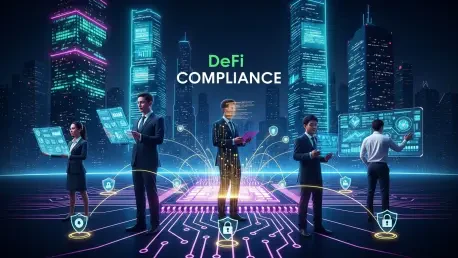Imagine a financial world where transactions happen instantly, without intermediaries, yet remain fully compliant with stringent regulations. This is the promise of decentralized finance (DeFi), a rapidly growing sector that has disrupted traditional banking and introduced new ways to handle financial operations. However, with this innovation comes a pressing challenge: how to ensure security and compliance in a space often defined by anonymity. Digital identity verification technology emerges as a potential solution, aiming to bridge the gap between regulatory demands and the decentralized ethos of DeFi. This review delves into the intricacies of this technology, exploring its features, performance, and transformative potential in reshaping digital finance.
Core Features of Digital Identity in DeFi
Embedding Identity in Smart Contracts
Digital identity technology in DeFi primarily focuses on integrating verification credentials directly into smart contracts. These self-executing agreements, which underpin many DeFi protocols, can now automatically validate a user’s identity before processing transactions. This mechanism ensures that only verified participants engage in activities, significantly reducing the risk of fraudulent or illicit behavior on the platform.
The technical foundation of this integration relies on blockchain’s immutable nature, where identity data is securely stored and accessed only when necessary. By automating this process, the technology minimizes human intervention, thereby enhancing efficiency and security. It also aligns with regulatory requirements like anti-money laundering (AML) standards, making DeFi platforms more accountable without sacrificing their decentralized structure.
This feature stands out for its ability to streamline compliance while maintaining the trustless nature of blockchain systems. It represents a critical step toward legitimizing DeFi in the eyes of regulators, potentially opening doors to broader adoption by institutional players who prioritize adherence to legal frameworks.
Technology-Driven Compliance Solutions
Beyond smart contracts, digital identity systems in DeFi leverage advanced tools such as artificial intelligence (AI) and blockchain monitoring software to enhance compliance. AI algorithms analyze transaction patterns in real time, flagging suspicious activities that might indicate money laundering or other financial crimes. These capabilities provide a proactive layer of security that traditional systems often lack.
Additionally, application programming interfaces (APIs) facilitate seamless communication between DeFi platforms and external regulatory databases. This connectivity ensures that identity verification processes remain up-to-date with evolving standards, offering a dynamic response to emerging threats. Blockchain monitoring tools further contribute by tracking wallet activities across networks, ensuring transparency in an otherwise opaque ecosystem.
The performance of these tools is notable for their precision and adaptability, though they require continuous updates to address new vulnerabilities. Their integration into DeFi platforms demonstrates a commitment to creating a transparent financial environment, balancing innovation with the need for oversight.
Regulatory Landscape and Recent Initiatives
The push for digital identity in DeFi is heavily influenced by regulatory developments, particularly in the United States. The U.S. Department of the Treasury has proposed a framework under the GENIUS Act to mandate identity verification within DeFi protocols. This initiative, currently in a public consultation phase, aims to strengthen AML and know-your-customer (KYC) compliance, addressing long-standing concerns about illicit activities in decentralized networks.
This proposal reflects a broader trend of automating compliance processes to keep pace with technological advancements. By embedding identity checks directly into DeFi systems, regulators hope to mitigate risks without stifling innovation. The consultation, open for stakeholder input, seeks to address technical and operational challenges, ensuring that the framework is both practical and effective.
The regulatory focus underscores the urgency of aligning DeFi with existing financial laws. While this could reshape market dynamics, it also poses questions about how such mandates will impact user autonomy, a core principle of decentralization. The outcome of these discussions will likely influence global standards for digital asset oversight.
Practical Applications and Market Impact
Digital identity verification finds practical use in preventing financial crimes within DeFi platforms. For instance, protocols handling large-scale lending or trading can deploy these systems to ensure that participants are legitimate, curbing risks like terrorist financing. Such applications enhance user trust, a critical factor in attracting mainstream adoption.
Moreover, the technology enables DeFi projects to cater to institutional investors who demand stringent compliance measures. By integrating identity checks, platforms can offer services that meet corporate and legal expectations, potentially unlocking significant capital inflows. This shift could redefine DeFi’s role in the broader financial ecosystem, positioning it as a viable alternative to traditional systems.
The implications extend beyond individual protocols to influence overall market confidence. As compliance becomes embedded in DeFi’s infrastructure, the sector may see reduced volatility driven by regulatory uncertainty. This stability could pave the way for more innovative financial products built on decentralized foundations.
Challenges in Implementation
Despite its promise, digital identity integration in DeFi faces significant hurdles. Privacy concerns top the list, as users accustomed to anonymity may resist systems that require personal data disclosure. Striking a balance between regulatory needs and user expectations remains a complex issue that developers must navigate carefully.
Scalability presents another challenge, as verifying identities across vast, decentralized networks demands substantial computational resources. Current solutions often struggle to handle high transaction volumes without compromising speed or cost-effectiveness. This limitation could hinder widespread adoption unless addressed through technological advancements.
Operational complexities also arise when adapting traditional verification methods to a decentralized context. Cybersecurity risks, including data breaches and hacking attempts, further complicate the landscape. Ongoing efforts aim to mitigate these issues, but achieving a seamless integration that satisfies all stakeholders remains an uphill battle.
Future Prospects and Technological Evolution
Looking ahead, digital identity in DeFi is poised for significant evolution. Anticipated advancements in AI and blockchain technology could enhance verification processes, making them faster and more secure. These innovations might also address scalability concerns, enabling broader implementation across diverse platforms.
Regulatory frameworks are expected to mature over the next few years, potentially from 2025 to 2027, setting clearer guidelines for compliance. Such developments could establish global benchmarks, fostering international collaboration in regulating digital assets. The interplay between technology and policy will likely shape how DeFi evolves as a mainstream financial tool.
The long-term impact may redefine trust in decentralized systems, encouraging greater participation from both retail and institutional players. As solutions emerge to balance oversight with autonomy, digital identity could become a cornerstone of DeFi, ensuring that innovation thrives within a secure, regulated environment.
Final Thoughts
Reflecting on this exploration, digital identity integration in DeFi proves to be a transformative technology with substantial potential, despite its challenges. Its ability to embed compliance into decentralized systems marks a significant milestone in aligning innovation with regulatory demands. The review highlights its strengths in enhancing security and transparency, even as privacy and scalability issues persist as critical pain points.
Moving forward, stakeholders should prioritize collaborative efforts to refine this technology, focusing on robust privacy safeguards and efficient scaling solutions. Developers and regulators alike must engage in dialogue to craft policies that support user autonomy while meeting legal standards. As a next step, investing in research for advanced encryption and decentralized verification methods could offer a path to overcoming current limitations, ensuring that DeFi remains a vibrant, secure space for financial innovation.









